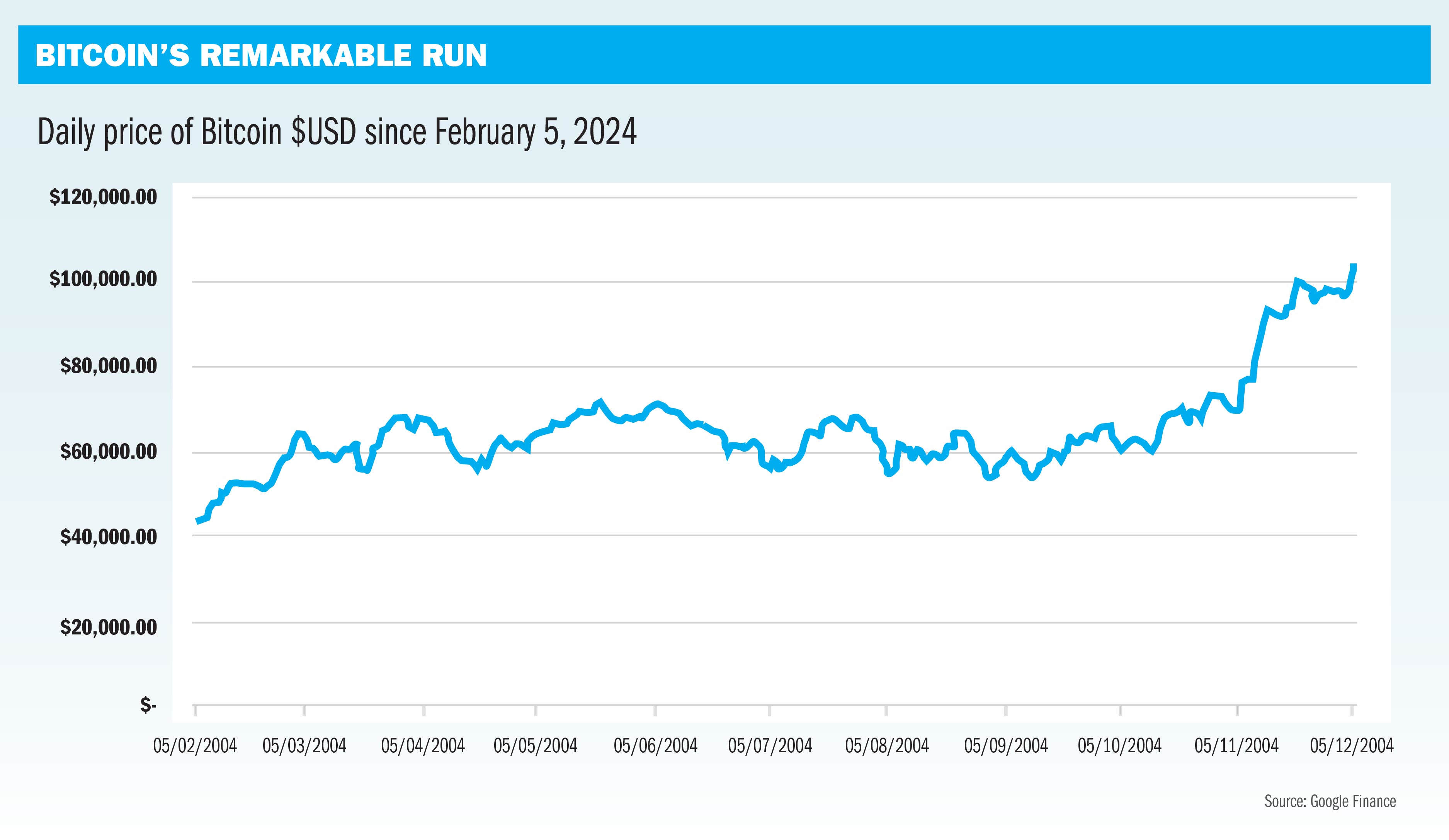Advisor says that clients will get bitcoin on DIY channels if firms and advisors don't bring access in house

Bitcoin crossing $100,000 USD yesterday was celebrated by advocates and trumpeted across traditional and social media channels. While an inherently arbitrary threshold, the rise of the cryptocurrency to the six-figure mark caps off a year where bitcoin’s value has grown by over 120 per cent. The ubiquity of bitcoin chatter on the news likely means advisors will have to field a few more bitcoin questions from clients. As more noise swirls about bitcoin, one advisor believes it is time for firms to offer some kind of exposure to clients.
Michael Zagari is an investment advisor and associate portfolio manager with Wellington-Altus Private Wealth. He’s a longstanding advocate for bitcoin and readily calls himself a “believer.” He explained, though, that the price rise of bitcoin this year has been driven by a widespread uptick in global investor interest, including the utility of bitcoin as a medium of exchange. In that context he believes that advisors and firms should consider offering clients access to the cryptocurrency simply because they will likely obtain it elsewhere otherwise.
“You blanket the entire world with the news that Bitcoin has reached 100,000 and even the naysayers are going to start to wonder what they’re missing out on. You’re at the point where maybe the bank advisors need to take a step back and ask why they are not allowing clients to access it,” Zagari says. “Are we pushing them to centralized exchanges like Coinbase, for them to be able to purchase their crypto needs? Clients are buying it somewhere at this point, and that is very clear. And the risk is huge for advisors, because if I'm able to provide access to this asset class and another advisor isn’t then those advisors could be losing clients.”
Zagari explained that while the election of Donald Trump was a catalyst for bitcoin, there has been more than just political sentiment driving its price increase. Paul Atkins, a pro-crypto former SEC commissioner, has been nominated as US SEC chair, contributing further to the sense that US politics will not stand in the way of cryptocurrencies. He notes, too, that with the rise of US spot bitcoin ETFs, more retail and institutional money has been able to access bitcoin, driving up demand.

The chief reason for this price rise, according to Zagari, is the increasing awareness of bitcoin’s utility as a medium of exchange. As more people have started to use bitcoin to transact peer-to-peer, Zagari says that demand has increased. He describes bitcoin as a disruptive technology and likens its impact on commerce to what digital photography did to Kodak.
While a believer in bitcoin, Zagari is aware that it has a volatile price component. On the same day it rose to over $103,000 USD it fell back to around $99,000. As its price accelerates Zagari says investors should expect volatility to accelerate as well. As much as he believes in bitcoin, Zagari emphasizes investment best practices when managing this asset for clients. Dollar cost averaging, reasonable allocations, and risk-aligned positions should be watchwords for any advisors entering this space.
When communicating about bitcoin with his clients, Zagari has stressed his team’s knowledge and understanding of the asset. He has outlined the risks and his strategy clearly, and explained how he and his team incorporate bitcoin into their models. As other advisors field inquiries from their clients Zagari says they need to be completely honest about what they know and what they don’t know.
This is also a moment when Zagari believes more firms should be considering what they offer on their product shelves. He believes that firms which do not allow for crypto allocations should ask themselves why. He argues that many independent firms, like his own, have already embraced bitcoin allocations in the context of a compliance-approved model that fits a client’s risk tolerance. That possible exposure could come in a range of forms, including an allocation cap rather than an open architecture model. He argues, though, that client demand is strong enough that limiting advisors’ ability to offer a bitcoin exposure may move clients closer to DIY channels.
“Run a survey with clients asking if they do hold Bitcoin outside of the firm. I'm sure the numbers will shock them,” Zagari says. “Firms should be asking themselves, why they are stopping clients from buying Bitcoin, what are the risks we see and why are our competitors allowing this? And then at that point, you have to make a judgment call whether you're in or out but accept the consequences either way. If you're in, then you need to make sure that you have the resources to properly monitor and ensure compliance.”



